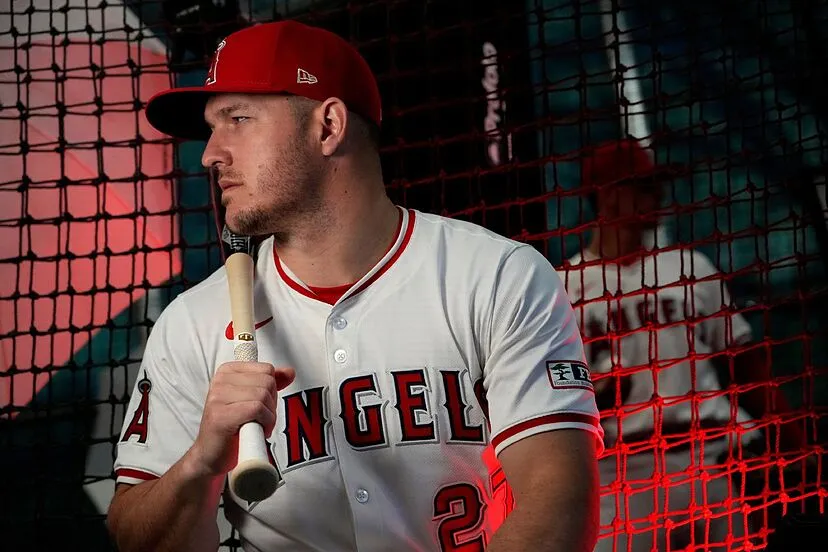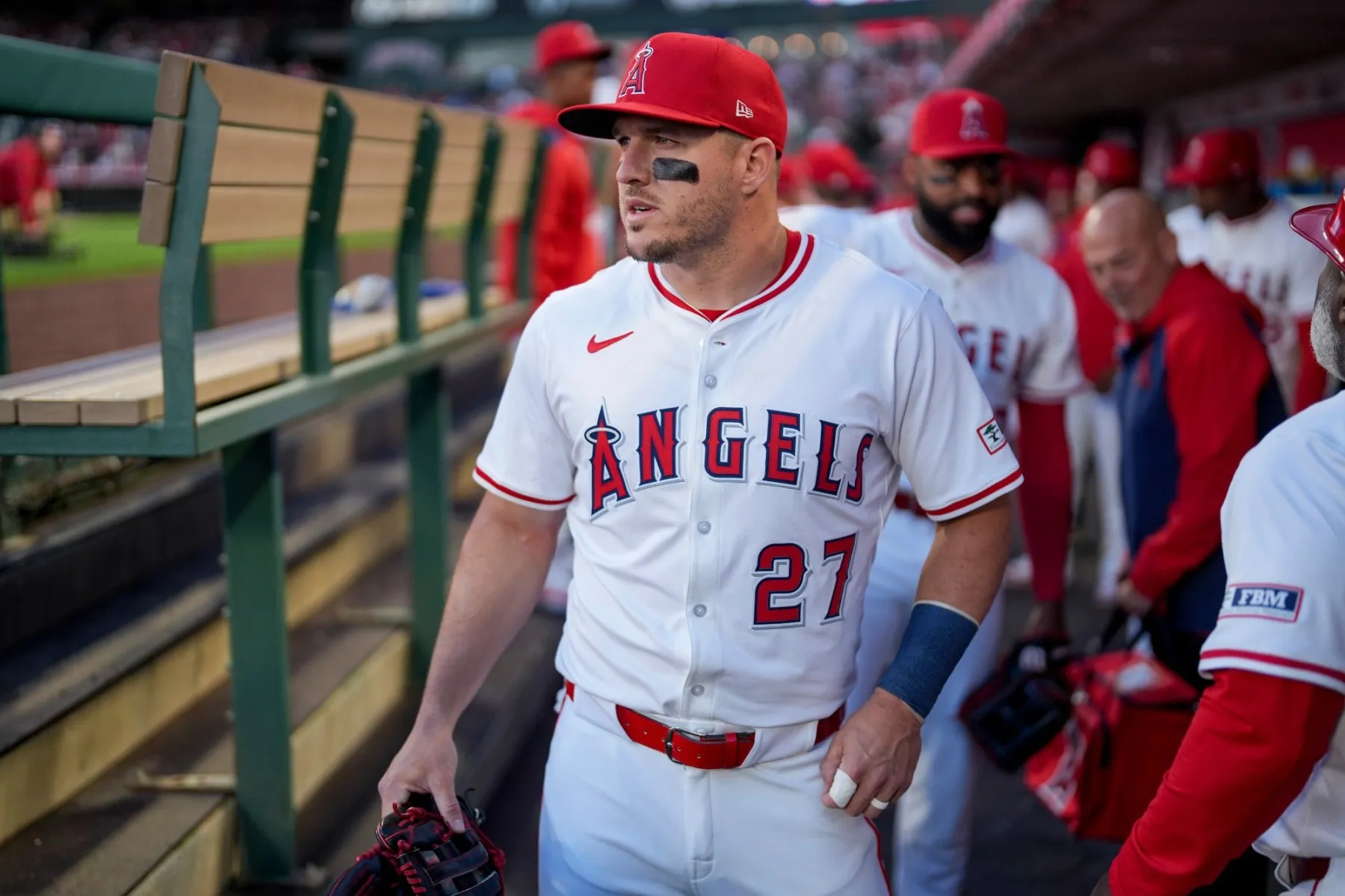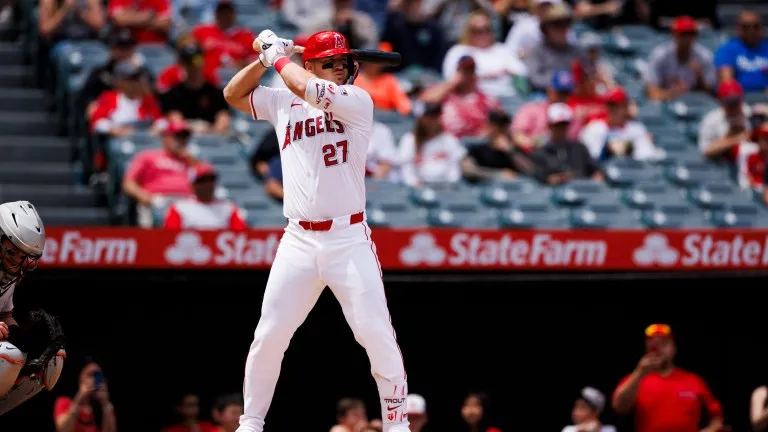

“Is This the End? Insiders Say Mike Trout’s Exit From Anaheim Is ‘Inevitable’”
The Beginning of the End: Mike Trout’s Legacy in Anaheim
For over a decade, Mike Trout has been the face of the Los Angeles Angels, a player who defined not only a franchise but also an era of Major League Baseball (MLB). With three MVP awards, ten All-Star selections, and a highlight reel that rivals the legends of the game, Trout has earned his place in the pantheon of baseball greats. Yet despite his brilliance, his team has consistently failed to translate his individual greatness into collective success. And now, whispers are turning into shouts: insiders around the league are saying that Mike Trout’s exit from Anaheim is no longer a matter of “if,” but “when.”

The possibility of Trout leaving the Angels was once unthinkable. He signed a 12-year, $426 million contract extension in 2019 — the richest in North American sports history at the time — signaling his commitment to the team that drafted him. However, the narrative has shifted dramatically over the past couple of seasons, and sources close to the organization suggest that a breakup is inevitable. So how did we get here?
A Star Trapped in Mediocrity
It’s hard to overstate just how consistently elite Mike Trout has been since debuting in 2011. He was immediately recognized as a generational talent, combining power, speed, discipline at the plate, and remarkable defense in center field. Year after year, he produced MVP-caliber stats, often leading the league in WAR (Wins Above Replacement) and other advanced metrics that underline his value.
Yet while Trout soared, the Angels floundered. Despite having one of the best players in baseball history, Anaheim has made the postseason only once during Trout’s career — a 2014 sweep at the hands of the Kansas City Royals. The front office has failed to build a consistent winner around him, and efforts to sign marquee talent — including Shohei Ohtani and Anthony Rendon — have been undermined by poor roster construction and injuries.
The irony of having two generational players, Trout and Ohtani, and still missing the playoffs year after year has become one of the defining failures in modern MLB. Now, with Ohtani gone to the Dodgers and the Angels once again languishing at the bottom of the standings, the questions about Trout’s future are more pointed than ever.
Mounting Frustrations and Lingering Injuries
Multiple league insiders have pointed to growing signs of frustration from Trout himself, even if he remains typically reserved in public comments. In subtle ways — body language on the field, clipped answers in postgame interviews, and declining involvement in promotional appearances — he seems less invested, less hopeful, less tied to the long-term vision of the franchise.
Adding to the tension is Trout’s recent injury history. He has played in only a fraction of games over the past three seasons due to various ailments, including back issues and calf strains. While still productive when healthy, his availability has become a concern, which paradoxically complicates his trade value even as it underscores his dwindling patience.
“He’s not getting younger, and he wants to win now,” said a former Angels executive speaking under condition of anonymity. “There’s a sense that the organization isn’t serious about competing, and he knows his prime is slipping away.“
Behind the Scenes: The Shift in Front Office Sentiment
For years, the Angels’ front office viewed Mike Trout as untouchable. He was the franchise’s crown jewel — a once-in-a-generation player and the ultimate team ambassador. But recent conversations around league offices hint at a subtle but significant shift: the Angels are now open to the idea of moving him, provided the return justifies the loss.
According to sources close to the situation, ownership is increasingly concerned about long-term financial flexibility. With Ohtani gone and the team entering a probable rebuild, paying over $37 million annually to a player whose best years may be behind him is becoming harder to justify — especially when the team lacks young depth or a clear path to contention.
Executives from rival teams are reportedly monitoring Trout’s situation closely, waiting for the right time to make a move. A few teams — including the Philadelphia Phillies, New York Yankees, and Los Angeles Dodgers — have been mentioned as potential suitors, though any deal would be complicated by Trout’s full no-trade clause and the financial burden of his contract.
The Emotional Toll of a Potential Exit
For fans in Anaheim and across the league, the idea of Mike Trout in another uniform is difficult to process. He’s been the one constant in a turbulent franchise, a loyal star who never publicly demanded a trade even as the team repeatedly fell short. If Trout were to leave, it would mark the end of an era, not just for the Angels but for baseball itself.
Trout’s departure would also carry an emotional weight that few trades do. He’s beloved by fans, respected by peers, and universally admired for his quiet dedication to the game. His humility, work ethic, and excellence have made him the model professional — the type of player any franchise would be lucky to build around.
Yet that same humility may be the reason he stayed too long. As one league source noted, “Mike was always too classy to ask out loud for what he probably should have demanded years ago — a chance to win elsewhere.“
The Trade Obstacles Ahead
Despite the growing speculation, trading Mike Trout will not be simple. His contract is massive, and many contending teams are already up against luxury tax limits. Moreover, his recent injuries raise concerns about how much value he can provide over the next several seasons. Any deal would likely require the Angels to eat a portion of his remaining salary, or accept a package of lesser prospects in return.
Then there’s the question of Trout’s own preferences. With a full no-trade clause, he has total control over his destination — and by all indications, he would only waive it for the right situation, likely a team on the East Coast (where he grew up in New Jersey) and one with immediate playoff aspirations.

Nevertheless, insiders agree that the mood is changing. What once felt impossible now seems increasingly plausible, if not probable. The Angels’ inability to capitalize on Trout’s prime may finally force their hand — and perhaps, finally, give Mike Trout the stage he deserves in October baseball.
What It Means for Baseball
If and when Mike Trout is traded, it will be one of the biggest moves in modern MLB history. His departure from Anaheim will ripple across the sport, redefining team dynamics, ticket sales, marketing, and the competitive landscape. For a sport that’s often criticized for failing to spotlight its biggest stars, Trout’s move to a contending team could reignite national interest in ways few other events could.
It may also serve as a cautionary tale for franchises who assume loyalty alone can build a winner. The Angels had a once-in-a-lifetime talent and failed to surround him with enough help. Their story is not just one of missed opportunities — it’s a reminder of how even greatness requires support.
If Trout finds success elsewhere, the contrast will be glaring. The narrative will no longer be about “Mike Trout, the great player who never won”, but about “Mike Trout, the great player who was finally set free.”
The Countdown Begins
As the trade deadline approaches and the Angels drift further out of contention, the pressure will mount. Every game, every comment, every injury report will be scrutinized through the lens of what’s coming next. The whispers are no longer background noise; they’re getting louder, more persistent, more real.
No official statement has been made. There’s no press conference scheduled. But make no mistake: the baseball world is bracing for what may be the most significant transaction of the decade.
Mike Trout has given everything to the Angels. In return, the organization gave him too little, too late. And now, insiders say, his exit from Anaheim is not just likely — it’s inevitable.


















